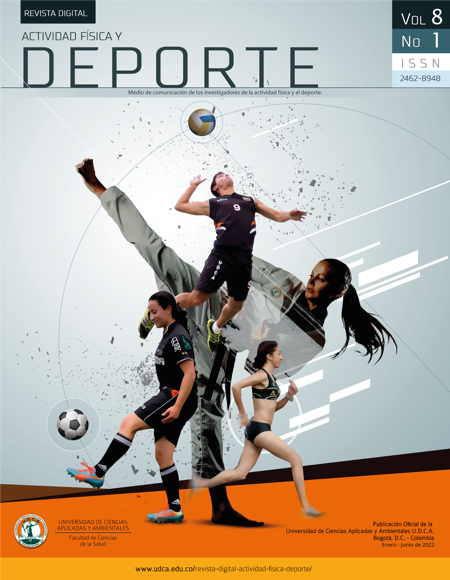Juegos tradicionales: aportes al desarrollo sociocultural en contextos educativos rurales
Traditional games: contribution to socio-cultural development in rural educational contexts
Contenido principal del artículo
Resumen
Introducción: Los juegos tradicionales, se constituyen como expresiones lúdicas que hacen parte del acervo cultural de las regiones y permiten identificar costumbres y tradiciones. Estas prácticas recreativas, además de fortalecer la identidad cultural, favorecen habilidades sociales y dinamizan los procesos de aprendizaje en contextos educativos, gracias a su valor pedagógico. Objetivo: Establecer el aporte de los juegos tradicionales del entorno local al desarrollo sociocultural, de los estudiantes de la Institución Educativa Técnica Ignacio Gil Sanabria Siachoque - Estudio piloto grado octavo. Metodología: El estudio corresponde a un enfoque cualitativo, enmarcado dentro de un paradigma hermenéutico, el cual, valida la aplicación de un modelo de investigación acción y algunos instrumentos de la cartografía social. En la primera fase, se realizó la caracterización de los juegos tradicionales, acudiendo a la entrevista semiestructurada y a la cartografía de los juegos tradicionales. Luego, se construyó la propuesta de intervención, en donde se desarrollaron “talleres de memoria”, que permiten la construcción social del conocimiento, favoreciendo el intercambio y la transferencia de saberes en torno a los juegos tradicionales. Resultados: Mediante el intercambio de saberes, producto de la interacción social, se logró ampliar el conocimiento y las percepciones de los estudiantes hacia los juegos tradicionales, convirtiéndolos en un recurso que dinamiza el desarrollo sociocultural de la población escolar. Conclusión: La interacción social representa un factor fundamental, no solo para la construcción del conocimiento, en este caso del juego tradicional, sino, también, para garantizar la pervivencia de estas prácticas, que se constituyen como un elemento de la herencia cultural y el patrimonio lúdico de la región.
Palabras clave:
Descargas
Datos de publicación
Perfil evaluadores/as N/D
Declaraciones de autoría
- Sociedad académica
- Universidad de Ciencias Aplicadas UDCA
- Editorial
- Universidad de Ciencias Aplicadas y Ambientales U.D.C.A
Detalles del artículo
Referencias (VER)
BARRETO, M.A.; RODRÍGUEZ, L.M. 2018. los juegos tradicionales en la escuela: influencia en la construcción de identidad cultural. Universidad Distrital Francisco José de Caldas. 104p.
BLASCO, J.; PÉREZ, J. 2003. Metodologías de la investigación en las ciencias de la actividad física y el deporte: Ampliando horizontes. Editorial Club Universitario. 309p.
CAILLOIS, R. 1986. Los juegos y los hombres, la máscara y el vértigo. Fondo de Cultura Económica. 331p.
CANTOR, C.E.; PALENCIA, C.M. 2017. Propuesta didáctica basada en los juegos tradicionales para fortalecer las habilidades sociales de los estudiantes de grado tercero del colegio universidad libre en la clase de educación física. Universidad libre. 111p.
GUERRA GARCÍA, J. 2020. El constructivismo en la educación y el aporte de la teoría sociocultural de Vygotsky para comprender la construcción del conocimiento en el ser humano. Dilemas Contemporáneos: Educación, Política y Valores.
https://doi.org/10.46377/dilemas.v32i1.2033
HUIZINGA, J. 2007. Homo Ludens. S.L. fondo de cultura economica de España. 244p.
LEIVAS, M.; ARISTIZABAL, A.; MENDOZA, M. 2017. Del cuerpo a la ciudad: repensando nuestros territorios desde la investigación colectiva con cartorafía social. Kult-Ur. 4:169–190.
https://doi.org/10.6035/Kult-ur.2017.4.8.6
MORENO BAÑOL, G. 2008. Juego tradicional Colombiano: una expresión lúdica y cultural para el desarrollo humano. Educación Física y Deporte. 27(2):93–99.
REYES, F. 2015. Teoria Sociocultural de de Lev Vigotsky. Disponible desde Internet en: https://es.slideshare.net/FernandaReyes12/teora-sociocultural-de-vigotsky-51305180?from_action=save
SAMACÁ, I. 2019. Lineamiento generales - Instrucciones de presentación de trabajos de grado. Universidad Nueva Granada.
TRIGUEROS, C. 2000. Nuevos significados del juego tradicional en el desarrollo curricular de la educación física en centros de educación primaria de Granada. Universidad de Granada. 683p.
VYGOTSKY, L.S. 1978. The development of higher psychological processes. Harvard University Press. 118p.









